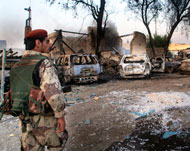Calm returns to southern Iraqi city
Calm has returned to the southern Iraqi city of Amara after two days of violent clashes between government security forces and Shia fighters.

Armed fighters quit the streets overnight, police returned to duty and life was slowly returning to normal in the city of around 350,000 people.
The city witnessed fierce fighting on Thursday and Friday after police arrested a member of radical cleric Moqtada al-Sadr’s Mahdi Army and accused him of planting a bomb which killed a senior intelligence officer.
Several hundred armed men attacked three police stations and set fire to them and hundreds of Iraqi soldiers had to be brought in to support police during violent clashes.
The latest violence came as George Bush, the US president, admitted that a change in direction might be necessary in Iraq.
The violence in Amara resulted in the deaths of at least 10 police officers and 15 fighters, a spokesman for the British military quoted the chief of police as saying.
The British handed over responsibility for Amara to Iraqi forces two months ago.
The fighters held the city for several hours against the police and security forces controlled by the Badr Brigade of the Supreme Council for the Islamic Revolution in Iraq (SCIRI), the country’s dominant political force.
Truce arranged
The British military spokesman in Basra played down the seriousness of the fighting by pointing out that 600 Iraqi soldiers had been able to force the Mahdi Army fighters off the streets, arrange a truce and return quiet to the city by Friday afternoon.
Major Charlie Burbridge, the British military spokesman, said: “It’s like when you take the training wheels off a bike. There are some wobbles. This was a pretty big wobble, but it’s still moving in the right direction.
 |
|
Bush says a change of tactics |
“They [Iraqi security forces] have applied a solution and at the moment it’s holding.
“At the moment, it’s tense but calm”.
Five hundred British soldiers are on standby if the Iraqi government decides it needs their help to calm the situation.
The fighters withdrew after a letter from al-Sadr was read out in mosques.
Mahdi Army
The leader of one armed group said: “The Mahdi Army do not control the city, the city is for all the Iraqis.
“The Mahdi Army do not control the police stations and all these reports are false.”
The fighting came several days after Nuri al-Maliki, the Iraqi prime minister, met al-Sadr at the cleric’s Najaf headquarters to discuss how to bring an end to the sectarian violence and bolster his four-month-old government.
The fighting is believed to have begun after the killing of Qassim al-Tamimi, the provincial head of police intelligence and a leading member of the Badr Brigade group.
In retaliation, his family kidnapped the teenage brother of the Mahdi Army commander in Amara and demanded he find and hand over al-Tamimi’s killers. The Mahdi Army then stormed into the city.
Iraq’s security
Despite the clashes, Donald Rumsfeld, the US defence secretary, told a Pentagon news conference that the government of Iraq would have to take over the country’s security “sooner rather than later”.
Meanwhile, President Bush acknowledged that a change in tactics might be needed.
 |
|
At least 15 people were killed |
“One of the reasons you are seeing more casualties is the enemy is active and so are our troops, along with Iraqis,” Bush said in an interview with The Associated Press.
He said he planned to consult General John Abizaid, the top US commander in the Middle East, and General George Casey, who leads the multinational forces in Iraq, in the next few days.
Bush said: “We are constantly adjusting our tactics so we can achieve the objectives and right now, it’s tough.
“It’s tough on the families who’ve lost a loved one. It’s tough for our citizens who look at it on TV. It’s hard on the Iraqis. They’ve lost a lot of life.”
Seventy-five American troops have died in Iraq during October and it is likely to become the deadliest month for US forces in nearly two years.